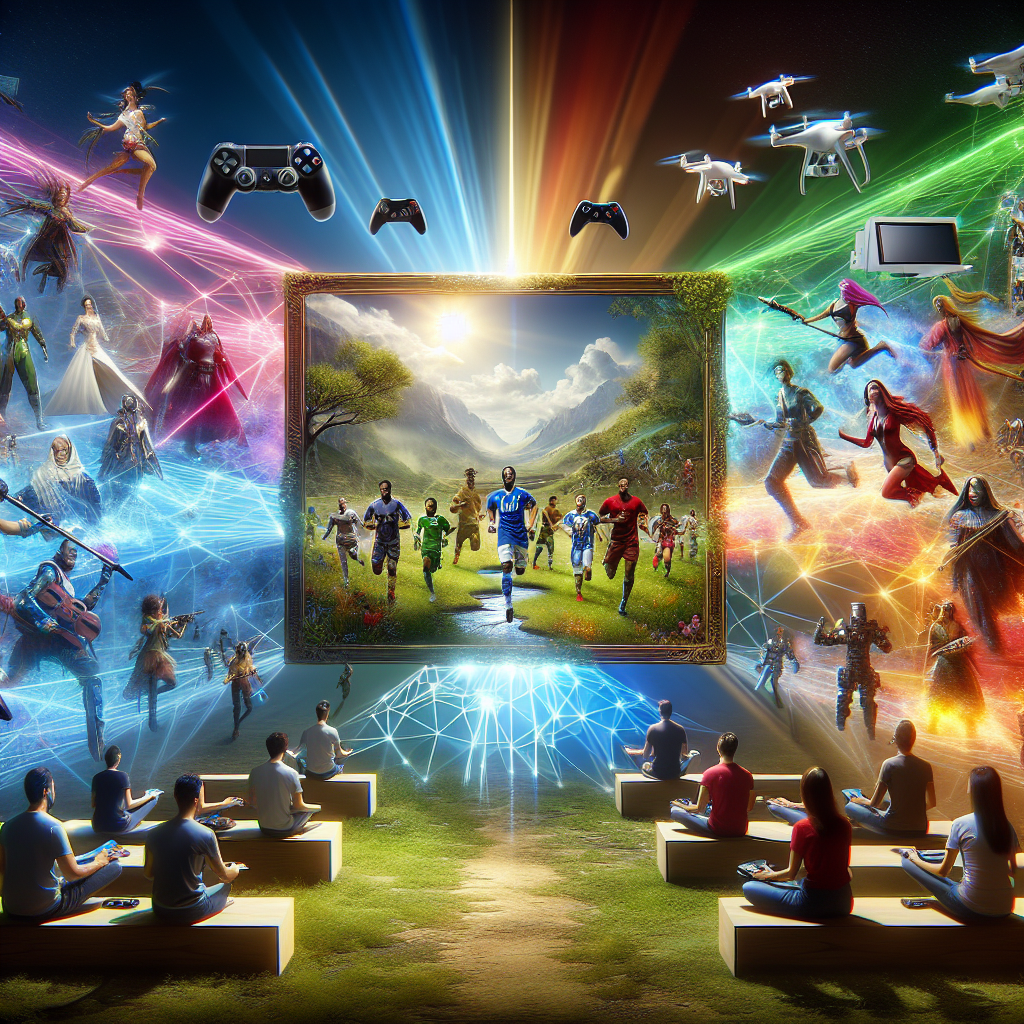Welcome to the exciting world of multiplayer games, where players from different platforms can come together for epic battles and cooperative adventures in cross-platform play. In this immersive experience, gamers can join forces regardless of whether they are playing on PC, console, or mobile devices, breaking down barriers and uniting communities across various gaming platforms. This innovative feature not only enhances the competitive spirit of gameplay but also promotes inclusivity and connectivity among players worldwide. Dive deep into the realm of cross-platform play and discover a whole new level of gaming camaraderie and excitement like never before. Get ready to embark on an unforgettable journey where the boundaries of gaming are limitless and the possibilities are endless.
Understanding Cross-Platform Play in Multiplayer Games

Cross-platform play in multiplayer games refers to the capability for gamers to play together across different gaming platforms, such as consoles, PC, and mobile devices. This functionality allows players using various devices to engage in the same gaming environment, breaking down the barriers traditionally imposed by platform-specific gaming ecosystems.
Definition of Cross-Platform Play
The concept of cross-platform play involves the seamless integration of different gaming systems, enabling users to interact and compete regardless of the devices they are using. It involves the implementation of technological solutions that facilitate communication and gameplay synchronization between platforms, ensuring a cohesive multiplayer experience for all participants.
Evolution of Cross-Platform Gaming
Cross-platform play has seen significant advancements over the years, with developers increasingly recognizing the value of allowing gamers to play together irrespective of their chosen platform. Initially, gaming silos were prevalent, restricting players to interact only with those using the same hardware. However, as technology progressed, the boundaries between platforms began to blur, paving the way for cross-platform compatibility.
Benefits of Cross-Platform Play for Gamers
-
Expanded Player Base: Cross-platform play broadens the pool of potential opponents and teammates, enhancing the overall multiplayer experience by providing a more diverse and dynamic gaming environment.
-
Increased Flexibility: Gamers have the freedom to choose their preferred platform without being limited by the availability of opponents on the same system, offering greater flexibility in how and where they play.
-
Enhanced Social Connectivity: Cross-platform play fosters connections between players regardless of their gaming setup, allowing friends to play together regardless of their chosen devices, promoting inclusivity and social interaction.
In conclusion, cross-platform play in multiplayer games represents a significant shift in the gaming landscape, offering players unprecedented opportunities to engage with a broader community of gamers and enjoy a more inclusive and interconnected gaming experience.
Technical Aspects of Cross-Platform Play
Cross-platform play in multiplayer games involves the intricate synchronization of different gaming systems to allow players using various consoles or devices to interact seamlessly in the same gaming environment. This functionality is made possible through the utilization of specialized technologies and protocols that facilitate communication and data exchange between diverse platforms.
How cross-platform play works
In essence, cross-platform play operates by establishing a unified network that serves as a bridge connecting players across different platforms. This network acts as a hub through which players can join multiplayer sessions, communicate with one another, and engage in gameplay regardless of the device they are using. To achieve this interoperability, game developers must design their software to be compatible with multiple platforms and ensure that the necessary infrastructure is in place to support cross-platform connectivity.
Challenges in implementing cross-platform play
Despite its benefits, implementing cross-platform play poses several challenges for developers. One of the primary obstacles is ensuring parity in gameplay experience across all platforms. This entails addressing differences in hardware capabilities, input methods, and performance optimizations to create a level playing field for all players. Additionally, compatibility issues, security concerns, and platform-specific restrictions can complicate the integration of cross-platform functionality, requiring developers to navigate these obstacles to deliver a seamless gaming experience.
Popular technologies enabling cross-platform gaming
To enable cross-platform play, developers leverage a range of technologies and tools designed to facilitate communication and data sharing between different systems. Some of the most commonly used technologies include middleware solutions like Unity and Unreal Engine, which offer cross-platform support out of the box. Additionally, cloud-based services such as Microsoft’s PlayFab and Google’s Firebase provide backend infrastructure for managing player data, matchmaking, and cross-platform communication. By leveraging these technologies, developers can streamline the implementation of cross-platform play and enhance the multiplayer experience for gamers across various devices.

Impact of Cross-Platform Play on the Gaming Community
Fostering inclusivity and diversity in gaming
Cross-platform play has revolutionized the gaming landscape by breaking down traditional barriers that once separated players based on their choice of gaming platform. By enabling gamers to connect and play together regardless of whether they are on console, PC, or mobile devices, cross-platform play promotes inclusivity and diversity within the gaming community. This inclusivity not only allows friends to play together regardless of their preferred gaming device but also opens up opportunities for players from different backgrounds and regions to come together in a shared virtual space.
Creating a larger player base and enhanced multiplayer experience
One of the most significant impacts of cross-platform play is the creation of a larger player base for multiplayer games. By allowing players from various platforms to join the same gaming servers, developers can ensure that there is a more extensive pool of participants available at any given time, leading to quicker matchmaking and more dynamic gameplay experiences. This larger player base not only benefits the gaming community by fostering a more vibrant and active online environment but also enhances the overall multiplayer experience by providing a more competitive and engaging gameplay environment.
Promoting collaboration and competition across different platforms
Cross-platform play encourages collaboration and competition among players across different gaming platforms, fostering a sense of unity and camaraderie within the gaming community. Whether teaming up with friends on different devices or competing against rivals from various platforms, cross-platform play promotes a sense of inclusivity and shared experience that transcends traditional gaming boundaries. This collaborative and competitive spirit not only enhances the social aspects of multiplayer gaming but also pushes players to improve their skills and strategies as they engage with a more diverse and challenging player base.
Misconceptions and Realities of Cross-Platform Play
Impact of Cross-Platform Play on the Gaming Community
- Addressing concerns about unfair advantages
In the realm of multiplayer gaming, one prevalent misconception surrounding cross-platform play is the fear of unfair advantages. Some players worry that those using a specific platform may have better performance or access to superior tools, giving them an edge over others. However, in reality, game developers strive to maintain balance across different platforms, ensuring that gameplay remains fair and competitive for all participants. By implementing measures such as skill-based matchmaking and standardized gameplay mechanics, developers aim to mitigate any potential advantages that could arise from playing on a particular platform.
- Debunking myths about cross-platform compatibility
Another common misconception related to cross-platform play revolves around compatibility issues. Players often express concerns about facing technical difficulties or limitations when trying to connect with friends using different gaming systems. Contrary to this belief, advancements in technology have significantly improved cross-platform compatibility, enabling seamless communication and gameplay between users on various devices. With the rise of cross-play functionality in many popular titles, gamers can now enjoy playing together regardless of their chosen platform, fostering a more inclusive and interconnected gaming community.
- Exploring the future of cross-platform gaming

Looking ahead, the future of cross-platform gaming appears promising, with increasing support from both developers and players. As the demand for cross-play features continues to grow, more game studios are embracing this trend and incorporating cross-platform functionality into their releases. This shift not only promotes a more diverse player base but also enhances the overall gaming experience by allowing individuals to collaborate and compete across different platforms seamlessly. By exploring innovative ways to expand cross-platform play, the gaming industry is poised to reshape how individuals engage with multiplayer games, fostering a more united and engaging community of players.
Popular Multiplayer Games Embracing Cross-Platform Play
Fortnite: Revolutionizing cross-platform gaming
Fortnite, developed by Epic Games, has been at the forefront of revolutionizing the world of cross-platform gaming. By allowing players on different gaming consoles such as PlayStation, Xbox, Switch, and PC to play together, Fortnite has created a truly unified gaming experience. This move towards cross-platform play has not only expanded the player base but has also fostered a sense of community among gamers who were previously restricted by platform barriers. The seamless integration of cross-play in Fortnite has set a new standard for multiplayer games looking to break down the walls between different gaming ecosystems.
Minecraft: Uniting players across various devices
Minecraft, the iconic sandbox game created by Mojang Studios, has made significant strides in embracing cross-platform play. Players can now join the same game regardless of whether they are playing on a console, PC, or mobile device. This level of interoperability has allowed friends from different platforms to come together in the blocky world of Minecraft, fostering collaboration and creativity on a global scale. By breaking down the barriers between devices, Minecraft has exemplified the potential of cross-platform play in creating a more inclusive and interconnected gaming community.
Rocket League: Enhancing multiplayer experience through cross-play
Rocket League, the high-octane vehicular soccer game developed by Psyonix, has prioritized cross-platform play to enhance the multiplayer experience for its players. By enabling cross-play between consoles like PlayStation and Xbox, as well as PC, Rocket League has significantly reduced matchmaking times and increased the pool of potential opponents for players. This seamless integration of cross-platform play has not only improved the competitiveness of matches but has also encouraged a more diverse player base to engage with the game. Rocket League’s commitment to cross-play has underscored the importance of breaking down platform barriers in multiplayer gaming for a more dynamic and engaging experience.
Strategies for Success in Cross-Platform Gaming
In the world of multiplayer gaming, embracing cross-platform play has become a prominent trend, breaking down barriers between different gaming communities. To excel in this innovative landscape, players can adopt various strategies to enhance their gaming experience and achieve success. Here are some key strategies to consider:
-
Communication tips for playing with friends on different platforms
Successful cross-platform gaming heavily relies on effective communication among players using different devices. Utilizing third-party communication platforms such as Discord or in-game chat features can bridge the gap between players on various platforms, ensuring seamless coordination during gameplay. Clear and concise communication is essential to strategize, coordinate movements, and react swiftly to in-game events, regardless of the devices being used. -
Leveraging cross-platform play for competitive advantage
Cross-platform play offers a unique opportunity for players to diversify their competition and enhance their skills by facing off against a broader range of opponents. To leverage this advantage, players should focus on adapting their gameplay style to accommodate different playstyles prevalent across various platforms. By studying the tendencies and strategies of players on different devices, gamers can develop a versatile gameplay approach that keeps them competitive across all platforms. -
Maximizing the cross-platform experience through customization and settings
Customization options and settings play a crucial role in optimizing the cross-platform gaming experience. Players should explore and adjust settings such as controls, graphics, and audio to suit their preferences and enhance performance across different platforms. Additionally, taking advantage of cross-platform progression features in games that offer them can provide continuity and convenience when switching between devices. By maximizing customization and settings, players can create a personalized gaming environment that caters to their individual preferences and boosts their overall gaming performance.
The Future of Multiplayer Gaming: Trends and Innovations
As the gaming industry continues to advance, the landscape of multiplayer gaming is constantly evolving with new trends and innovations. Here are some key aspects shaping the future of multiplayer gaming with a focus on cross-platform play:
Emerging technologies shaping the future of cross-platform play
-
Cloud Gaming: The rise of cloud gaming services like Google Stadia and Microsoft xCloud is revolutionizing the way multiplayer games are accessed and played across different platforms. By leveraging the power of cloud computing, players can now enjoy seamless cross-platform experiences without the limitations of hardware specifications.
-
Blockchain Integration: The integration of blockchain technology in multiplayer games is opening up new possibilities for cross-platform play by enabling secure and transparent in-game transactions, item trading, and progression tracking across different gaming ecosystems. This innovation is expected to enhance player experiences and foster a more connected gaming community.
-
AI-driven Matchmaking: Advanced artificial intelligence algorithms are being utilized to improve matchmaking systems in multiplayer games, ensuring fair and balanced gameplay experiences for players across different platforms. By analyzing player behavior and skill levels in real-time, AI-driven matchmaking enhances cross-platform play by creating more competitive and engaging gaming environments.
Integration of cross-platform features in upcoming game releases
-
Unified Player Progression: Game developers are increasingly focusing on implementing unified player progression systems that allow players to seamlessly carry over their achievements, rewards, and in-game purchases across multiple platforms. This integration not only enhances player convenience but also promotes cross-platform engagement and retention.
-
Cross-Platform Voice Chat: The inclusion of cross-platform voice chat features in upcoming game releases is becoming a standard practice to facilitate communication and collaboration among players regardless of the devices they are using. This integration promotes teamwork and social interaction, enriching the overall multiplayer gaming experience.
Predictions for the evolution of multiplayer gaming with cross-platform compatibility
-
Increased Game Accessibility: With the growing emphasis on cross-platform play, multiplayer games are expected to become more accessible to a wider audience of players, regardless of their preferred gaming platform. This trend is likely to democratize the gaming experience and foster greater inclusivity within the gaming community.
-
Enhanced Competitive Esports: The integration of cross-platform play is anticipated to drive the growth of competitive esports by enabling players from different platforms to compete against each other in organized tournaments and events. This evolution is set to redefine the landscape of esports and elevate the level of competition in multiplayer gaming.
FAQs for Exploring the World of Multiplayer Games: A Deep Dive into Cross-Platform Play
What does cross-platform play mean in multiplayer games?
Cross-platform play in multiplayer games refers to the ability for players to compete or cooperate with each other across different gaming platforms. This means that players on PC, consoles, and even mobile devices can all play together in the same game, regardless of which platform they are using.
Which multiplayer games currently support cross-platform play?
There are a growing number of multiplayer games that support cross-platform play, including popular titles such as Fortnite, Rocket League, Minecraft, Call of Duty: Warzone, and Sea of Thieves. These games allow players on different platforms to team up or compete against each other in the same game.
How does cross-platform play benefit players?
Cross-platform play allows players to connect with friends and other players from around the world, regardless of the platform they are using. This can help to create larger player populations, reduce matchmaking times, and increase the overall competitiveness of multiplayer games. Additionally, cross-platform play can extend the lifespan of a game by ensuring that players can continue to find matches even as the player base dwindles on a specific platform.
Are there any limitations to cross-platform play in multiplayer games?
While cross-platform play has many benefits, there are some limitations to consider. One common limitation is that not all platforms may support the same features or updates, which can lead to discrepancies in gameplay experiences. Additionally, some games may not support cross-platform play due to technical constraints or concerns about balancing gameplay across different platforms.
How can players take advantage of cross-platform play in multiplayer games?
To take advantage of cross-platform play in multiplayer games, players should ensure that they have created an account or profile that is compatible with cross-platform play. They should also be aware of any limitations or restrictions that may apply when playing with users on different platforms, such as voice chat compatibility or control scheme differences. By actively seeking out cross-platform play opportunities, players can expand their gaming experience and connect with a wider community of players.
